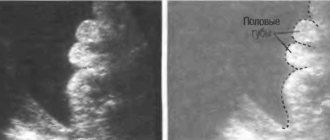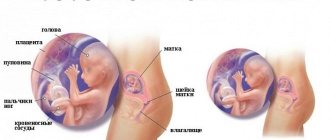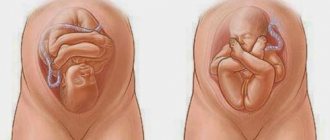Many women who want to get pregnant want to determine the implementation of conception even before the onset of menstruation. You can determine the signs of pregnancy even after 1 week from the moment of conception.
True, all gynecologists count pregnancy from the first day of the last menstruation, these are the calculations that are considered the most accurate, so talking about signs of pregnancy in the first week from the point of view of obstetricians and gynecologists is absolutely useless. We will talk about the symptoms that indicate that conception has taken place.
What happens after conception?
You should know that pregnancy occurs on average within 10 days after fertilization of the egg. It is during this period that the egg leaves the tube into the uterine cavity and attaches to its surface. During this period, a woman may notice certain changes in her body, which gynecologists classify as signs of 1 week pregnancy.
After the egg has entered the uterus, the woman’s body intensively begins to produce a hormone, without which it is impossible to bear a child. In gynecology, this hormone is known as human chorionic gonadotropin, or hCG.
The main purpose of this hormone in the 1st and 2nd trimesters is to maintain the vital activity of the corpus luteum, which secretes progesterone. If there is a lack of progesterone in the body of a pregnant woman, the threat of interrupting the process of bearing a child increases.
Human chorionic gonadotropin found in a woman’s blood is the main sign of pregnancy 2 weeks after conception. It is at this time that, as a rule, a blood or urine test is taken.
Women sometimes try to determine the presence of hCG in the body with the help of special tests, using them at home. But the results obtained are not always reliable, which is due to the low sensitivity of the test.
Movements
The least accurate signs on the basis of which the period can be determined are movements. According to obstetric textbooks, nulliparous women begin to feel the first tremors at 20 weeks, their more experienced colleagues at 17-18. But as practice shows, everything depends so much on the woman’s sensitivity, sometimes even suspiciousness, the place of attachment of the fetus in the uterus and the temperament of the unborn child that some expectant mothers already at 14-15 weeks boast of their first “kicks”, while others fall into real panic due to the fact that at 21-22 weeks they still don’t feel anything at all.
Sometimes the date of conception can help when calculating the gestational age if it is known more or less accurately.
Woman's feelings
After conception, a woman does not always notice the changes occurring in the body, since the egg is just beginning to mature in the uterus. The follicle gradually increases in size and produces estrogen, the amount of which can lead to different intensity of manifestation of the main signs of pregnancy at 4 weeks after conception.
As a rule, no sensations occur at 1, 2 and 3 weeks, even if the woman is pregnant.
The following signs may indicate early pregnancy:
- absence of menstruation;
- irritability;
- drowsiness;
- tearfulness.
All signs after fertilization are difficult to distinguish from the symptoms of premenstrual syndrome.
- Soon after conception, a woman notices how her emotional state changes; joy often changes to anger and vice versa. Many people experience such signs at 6 weeks of pregnancy, and do not go away until childbirth.
- The first week falls on the first half of the menstrual cycle, so the symptoms are almost the same. During this period, the woman’s stomach feels tight, which is caused by contractions of the uterus; after the cycle is completed, the discomfort disappears and the pregnant woman feels much better.
- Nausea and swelling of the mammary glands are not felt at 1 week; usually such changes in the body of the future mother occur at 5, 6, 7 or 8 weeks from the moment of fertilization of the egg.
- The first week is very important, many gynecologists even call it decisive, since the development of the fetus, the well-being of the pregnant woman and the process of childbirth itself depend on how it goes. The embryo is fixed, so after 7-10 days it will be clear whether the pregnancy will continue or not.
Discharge in a pregnant woman
The appearance of menstruation at 1 week is considered a fairly common phenomenon; it performs the function of cleansing and preparing the uterus for the implantation of a fertilized egg in it. But you should know that the appearance of spotting as a sign of pregnancy at 7 weeks should not be considered, since this is already considered a pathology.
During all trimesters of pregnancy, the appearance of white, transparent and stretchy vaginal discharge in very small quantities is considered normal. Sometimes, however, such discharge can be infectious in nature, but this can be determined using a smear.
If the results of the analysis do not reveal pathogenic microorganisms, there is no cause for concern.
Is it possible to get pregnant immediately after the end of menstruation?
The maturation of the egg can begin immediately after the arrival of menstruation. In this case, she will be completely ready for fertilization by the end of her period. The onset of pregnancy 1-3 days after the critical days is quite likely.
Girls with a short cycle are advised to take care of contraception
The highest risk of successful conception is present in women who have a short menstrual cycle. Its duration is usually 20-22 days. In this case, pregnancy is likely immediately after the end of monthly discharge.
If the pregnancy is unplanned, immediately after menstruation it is necessary to use contraception after the menstrual period. This is especially true for women who have a short menstrual cycle. They ovulate immediately after their period.
When can you find out about pregnancy and what needs to be done?
Can't figure out how to find out if you're pregnant without a test? There is a lot of research and discussion on this topic, and there is already some specific information that women use. You can try to determine a possible pregnancy no earlier than the 25th day of the menstrual cycle, that is, approximately 3-5 days before the start of the next period. To do this you can use the following methods:
- Buy a very expensive pregnancy test at the pharmacy.
He supposedly can determine whether conception occurred almost the next day after intercourse. But we don’t recommend you do this, because other than spending money, you won’t be able to do anything else. The level of human chorionic gonadotropin, which is released after fertilization, is still too low in the blood for the test to detect pregnancy so early. After a few days of delay, that's when you need to take a pregnancy test.
- Sign up for an ultrasound.
An ultrasound examination of the uterus and appendages, carried out using modern equipment, will determine the presence or absence of pregnancy at the earliest possible stage without risk to your health, and will also exclude ectopic pregnancy, which, if present, should be recognized as early as possible.
- Donate blood for the hCG hormone.
Already 10 days after fertilization, its level in the blood is very high. Therefore, if you are concerned about the question of how to find out early pregnancy as quickly and accurately as possible, use this method. But, if you are taking hormonal medications, inform the laboratory assistant who will take your test in advance, because this fact may affect the correctness of the results.
Pregnant or not?
The main symptoms are a delay in menstruation and a change in the shape and color of the nipples of the mammary gland. Afterwards, you can take a pregnancy test and take a laboratory test for hCG (pregnancy hormone).
But if there is no time or desire to wait for this period, what signs will indicate the onset of pregnancy in the first days?
- Increased salivation - especially when eating or even looking at cooking magazines.
- Leg cramps during sleep are a change in blood circulation in the body.
- A metallic taste usually appears in the first week of fertilization of the egg.
- Pigmentation – face, body, along the hairline.
- Bloating is a disruption of the digestive tract, disorder, flatulence, which is characterized by the body’s rejection of a “foreign object.”
You can find out about conception without a test if you have nausea, especially in the first half of the day, after waking up. When brushing your teeth, you may feel the urge to vomit. It is also necessary to examine the mammary gland; during pregnancy, the nipples become sensitive, swell, and discomfort occurs during fast walking or running.
When the growth of the hormone progesterone increases, a woman may break into a sweat for no reason. You feel drowsy, tired, and constantly want to sleep, even during the daytime. In this case, rest is necessary, and therefore you should not ignore such a symptom.
There is also a frequent urge to go to the toilet, especially at night, with a small amount of urine being released. There may be cramps in the lower abdomen and a feeling of heaviness.
In case of bloody discharge, it is imperative to consult a specialist, especially if a pregnancy test has already shown a positive result. Light-colored discharge indicates the attachment of the embryo in the uterus, and therefore should not cause concern.
Why does the stomach feel tight in the early stages of pregnancy?
This phenomenon is often a consequence of natural changes that occur in the female body. That is, he is preparing for pregnancy. Doctors consider nagging pain to be one of the first symptoms of pregnancy:
- Most often it is felt at the moment of implantation of the embryo to the uterine wall. In addition, at this time, malaise, weakness, and swelling of the mammary glands are observed.
- Increased blood flow in the uterus occurs due to the delivery of oxygen and nutrition to the embryo, resulting in a nagging pain in the lower abdomen.
- An increase in the concentration of progesterone entails a feeling of discomfort not only in the abdomen, but also in the lower back.
- Discomfort in the lower abdomen is also associated with enlargement and displacement of the uterus.
However, in some cases, the stomach pulls in the early stages of pregnancy for reasons not related to this process. Among them:
- Digestive problems - flatulence, diarrhea and constipation are common companions for pregnant women. They provoke discomfort. When intestinal function is restored, all symptoms disappear.
- Appendicitis - it is characterized by nausea, vomiting, headache, fever, pain in the right side of the abdomen.
- Infectious diseases of the genitourinary system and kidneys - the most common pathology is cystitis. In addition to nagging pain in the abdominal area, there is an increase in temperature, painful and frequent urination, and protein appears in the blood and urine.
Doctors recommend pregnant women to contact an antenatal clinic in case of any ailment to find out its cause and take the necessary measures in a timely manner.
What folk methods will help determine pregnancy?
There are many different beliefs, according to which an interesting situation can be identified without special tests, by trusting in folk methods. Let's tell you more about how to determine pregnancy using a bow, a wedding ring, and even home flowers. It sounds absurd to some extent, but our great-great-grandmothers firmly believed in the reliability of folk methods for determining pregnancy. So:
- How to find out if you are pregnant using an onion?
Plant onions in two glasses and wish for pregnancy on one of them. If the one you bet on sprouted faster, then you can be congratulated.
- How to determine pregnancy using a ring?
The woman should lie on her back, and someone should hang a wedding ring strung on her hair over her stomach. If the ring starts to spin in different directions, it means you are pregnant.
- How to determine pregnancy using home flowers?
A woman needs to collect her morning urine and water her flowers with it. If they begin to grow and bloom brightly, then there is no doubt about pregnancy.
In addition, there are also prophetic dreams that can signal a woman about her interesting situation. For example, a fish or a laying duck seen in a dream indicates pregnancy. Of course, on this basis you should not run to your gynecologist and declare your suspicions. When the test shows pregnancy, then you can safely go to the doctor. However, do not forget that the test will give the correct result only if you carry it out according to the instructions, which clearly state: when you can take a pregnancy test and how to determine pregnancy using the test.
Basal temperature measurement
Fluctuations in basal temperature reflect the course of the menstrual cycle. So, during the cycle this indicator is approximately 36.5⁰ C. When ovulation occurs, the temperature exceeds 37⁰ C and remains until the onset of the next cycle, falling to 36.5⁰ C the day before the onset of menstruation. However, if the egg is fertilized, the temperature does not drop, but remains at a level above 37⁰ C. This method cannot be called very reliable, since if a woman has hormonal disorders, temperature readings cannot have diagnostic value. In addition, temperature data can be affected by incorrect measurement, stress, overwork or climate change.
How to determine pregnancy if you are menstruating: internal signs
Internal signs of pregnancy in the presence of menstruation include:
increase in basal temperature;
presence of hCG in urine;
the appearance of unusual discharge.
Naturally, during menstruation it is quite difficult to control the nature of the discharge, but many women notice that before the bloody discharge there was a large amount of white discharge, as with thrush.
Another sign of pregnancy may be an increase in basal temperature, which constantly remains at 37.2-37.4 0. To measure it you need to:
waking up in the morning and without getting out of bed, insert a thermometer into the rectum;
measure the temperature for 7-10 minutes or until a sound signal appears if the measurement was carried out with an electronic thermometer;
record the temperature in your notepad.
Naturally, a single measurement may not give a reliable picture. Gynecologists recommend keeping a schedule for measuring basal temperature for 3 months in order to track all phases of the cycle with an accuracy of 1 day.
Additional signs of pregnancy
The sense of smell is heightened, odors begin to bring unpleasant sensations, causing nausea and the urge to vomit. Often, even your favorite perfume is repulsive. Due to hormonal disorders, symptoms of acute respiratory infections may be observed - weakness, malaise, nasal congestion (the immune system is suppressed).
Not least important are emotional and psychological changes - the expectant mother becomes irritable, there are frequent mood swings, and relationships with others deteriorate.
Severe physiological symptoms:
- Headache;
- Swelling in the legs;
- Discomfort in the lumbar region;
- Increased body temperature;
- Allergic rashes to familiar objects, food, wool, flowers, etc.
Sexual desire changes, both in one direction and the other.









